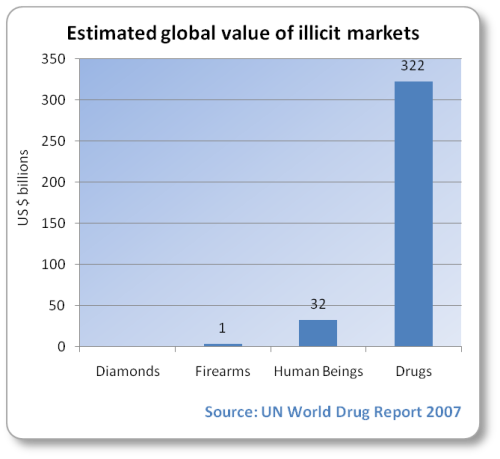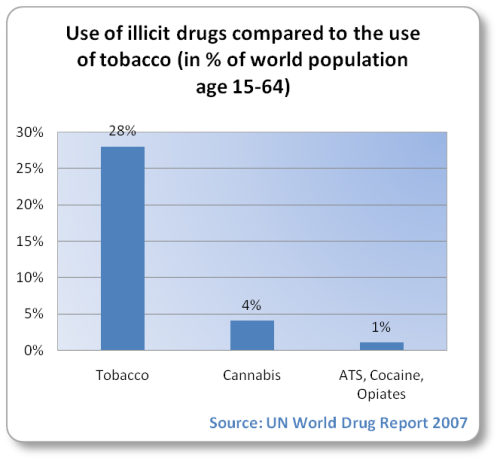Illicit Drugs
Author and Page information
This print version has been auto-generated from https://www.globalissues.org/article/755/illicit-drugs
On this page:
Illicit drugs: a huge global market
The illicit drugs trade (also referred to as the illegal drugs trade or drug trafficking) is one of the largest global businesses, at some $322 billion, according to the UN World Drug Report, 20071.
It attracts criminal organizations because the potential profits are significantly more than from other criminal commodities:

As the 2007 report notes (p.170), the high value is understandable because unlike human beings, diamonds or firearms, the drug supply is consumed each year and in need of continuous renewal.
It is also a global issue because
profits [from illicit drugs] accrue to a wide range of actors, from poor rural farmers to affluent urban dealers. But, in many instances, the single most profitable sector of the market is the process of transporting the drugs internationally. The funds raised by trafficking groups can be used to underwrite other criminal activity and even political insurgency.
The main illicit drugs are the opiates (mostly heroin), cocaine, cannabis, and ATS (amphetamine-type stimulants) such as amphetamines, methamphetamine and ecstasy.
The UN estimates that some 200 million people (4.8% of the world’s population aged 15-64) use illegal drugs annually with 25 million being classed as problem users (0.6%). (See p.9 of the report.)
Legal and Illegal Drugs
A lot of effort goes into tackling illegal drugs, but there are some legal drugs that affect far more people worldwide than illegal drugs: tobacco and alcohol.
The 2007 UN World Drug Report (p.30) compares usage of illegal drugs with tobacco and finds tobacco usage to be far higher:

(Tobacco and alcohol are considered drugs by health professionals even though these ones are legal and usually regulated in some way. They are all mind-altering/addictive. In that context, drug use of some sort, such as alcohol and marijuana, has been common throughout the history of human civilization.)
It seems that people like to consume mind-altering substances even though there may be serious health implications associated with many of these drugs. But today, there is also the criminal element that drugs attract.
Tackling the problem: criminalize or decriminalize?
A common approach (and one taken by countries such as the United States and international organizations such as the United Nations Office on Drugs and Crime) is that drugs should be made illegal and there should be strong emphasis on clamping down on the illegal drugs trade. In many countries, this has led to extra law-enforcement costs and overflowing prisons. (The drugs problem is seen as a criminal issue.)
The Netherlands, however, has taken a different approach and partly decriminalized certain soft
drugs in small proportions. (The drugs problem is seen primarily as a health issue.) This has had a knock-on effect of drug tourism
where some tourists go there to get substances.
Should illegal drugs be decriminalized?
The prestigious British Medical Journal (BMJ) provided some interesting insights into the question of whether drugs should be decriminalized or not:
Why drugs should not be decriminalized
Joseph A Califano, Jr, chairman of The National Center on Addiction and Substance Abuse at Columbia University argues that drugs are dangerous, therefore illegal. Legalizing them risks increasing their availability:
Drugs are not dangerous because they are illegal; they are illegal because they are dangerous. A child who reaches age 21 without smoking, misusing alcohol, or using illegal drugs is virtually certain to never do so. Today, most children don’t use illicit drugs, but all of them, particularly the poorest, are vulnerable to misuse and addiction. Legalization and decriminalization—policies certain to increase illegal drug availability and use among our children—hardly qualify as public health approaches.
Why drugs should be decriminalized
In the same BMJ as mentioned earlier Dr. Kailash Chand argues that drugs should be decriminalized because drugs drive crime:
Many people may think that taking drugs is inherently wrong and so should be illegal. But there is a question of effectiveness—does making it illegal stop people doing it? The answer is clearly no. One could even argue that legalization would eliminate part of the attraction of taking drugs—the allure of doing something illegal.
…
Countries like Afghanistan, Columbia, and Jamaica have had their economies rocked and destabilized by the illegal market while bribery, corruption, and conflict have ruled.
In the UK we have cut off huge swathes of the population, branding them criminals and creating an underclass of people who no longer feel part of our society. A sensible policy of regulation and control would reduce burglary, cut gun crime, bring women off the streets, clear out our overflowing prisons, and raise billions in tax revenues. Drug users could buy from places where they could be sure the drugs had not been cut with dangerous, cost saving chemicals. There would be clear information about the risks involved and guidance on how to seek treatment. It is time to allow adults the freedom to make decisions about the harmful substances they consume.
Decriminalization as regulation and control
It is easy to assume talk of decriminalization means a kind of free-for-all where there is no care for people addicted to drugs, and letting anyone use them when they want.
Yet both Chand’s argument above is really about regulation and control. While still against legalization/decriminalization, Califano also adds that more resources and energy should be devoted to research, prevention, and treatment, and each citizen and institution should take responsibility to combat all substance misuse and addiction.
Supply and demand
The approach Califano advocates is to help people understand what they are doing (i.e. tackle the demand side). This seems important because the increased recreational use we see—often in the wealthiest countries—may point to deeper social/personal problems and issues.
(Just recently, the UN accused celebrities of often being involved in illicit drug trafficking or illegal drug use and that it is often glamorized. They fear that this may send out the wrong message to young people, too. In addition, they accused some countries off letting celebrities drug-takers off too lightly5 when caught.)
The approach Chand advocates seems to imply addressing the supply side by taking away control from criminals, and managing the demand side by trying to provide a safer environment, at least as a starting point to address immediate issues.
The UN’s approach of being tough against illegal drugs could be having some effects. The above-mentioned UN World Drug Report 2007 begins its overview stating that the global drugs problem is being contained:
The global drug problem is being contained. The production and consumption of cannabis, cocaine, amphetamines and ecstasy have stabilized at the global level—with one exception. The exception is the continuing expansion of opium production in Afghanistan. This expansion continues to pose a threat—to the security of the country and to the global containment of opiates abuse. Even in Afghanistan, however, the large scale production of opium is concentrated and expanding in a few southern provinces where the authority of the central government is currently limited and insurgents continue to exploit the profits of the opium trade.
On the whole, most indications point to a leveling of growth in all of the main illegal drug markets. This is good news and may indicate an important juncture in long term drug control. A stable and contained problem is easier to address than one which is expanding chaotically, provided it is seen as an opportunity for renewed commitment rather than an excuse to decrease vigilance.
However, while the report shows the number of seizures of illegal drugs increasing more than two-fold between 1985 and 2005, the use has not gone down in proportion; it has stabilized
. It may be that containment is working, but maybe it is not effective as other measures?
Furthermore, it seems the costs are very high for this approach too. The US’s war on drugs
is in the order of billions. And then there are the associated effects of increased crime and health problems because the market is largely controlled by criminals.
This last point was explained quite well by Tom Lloyd, former chief inspector of Cambridgshire Police in the UK. In a radio interview on BBC’s Radio 5 Live7 (March 5, 2008), Lloyd raised some important issues:
- He felt over a longer period of 30 to 40 years, the international policy was a failed policy because of the increase in illegal drugs, the increase in associated crime, and the increasing health problems by substance users.
- He added that while many human beings seem to like taking mind-altering drugs, international policies have ensured the mind altering drugs are supplied by criminals who have no regard to the health of the users, or the crime that results.
- Banning drugs has failed, in his opinion. However, instead of some
free-for-all
, regulating drugs would take the market away from the criminals, dramatically reducing the harms caused by prohibition (because prohibition leads to lots of death from the increased crime and health issues that results from criminals controlling the market).
Lloyd’s approach is to initially get control over the issue through this regulation of it so that at least we stand a chance
of doing something about drug use that can help reduce the harm. If someone is addicted to drugs, it is far worse if the supplier is a criminal because the substance could have impurities, causing further health problems, he argues.
There are also some medicinal uses of some drugs. When these are made illegal, research or provision of these is restricted.
Related to the crime aspects of illegal drugs is corruption8. Professor Robert Neild from Trinity College, Cambridge University wrote the book Public Corruption; The Dark Side of Social Evolution (London: Anthem Press, 2002). Neild suggested that international and national laws in rich countries that prohibit drugs may serve to produce a scarcity value irresistible to producers, smugglers and dealers
thus contributing immensely to the problem of corruption.
Neild adds that governments and civil society in the third world are often undermined, sometimes destroyed
by the violence and corruption that goes with the drug trade. This is probably the most important way in which the policies of rich countries foster corruption and violence. Yet the effect on the Third World seems scarcely to enter discussion of alternative drug policies in the rich countries.
Legalizing drugs, a system of taxation and regulation, comparable to that applied to tobacco and alcohol might do more to reduce corruption in the world than any other measure rich countries could take, Neild suggests.
Complicating this further, are the two major legal drugs that kill far more people than illegal drugs: tobacco and alcohol. Although these are legal and regulated, they continue to put enormous strains on social systems such as police and health services. In the United Kingdom, an excess drinking culture is affecting many young people and is a constant theme on mainstream news.
It would seem that tackling both supply (i.e. the criminal aspects) as well as demand (the social conditions that create the demand) both need addressing but by no means are the policy choices clear cut.
(For further view points and arguments, see for example this Wikipedia article9.)
Other issues
This page is quite short, for a topic that is very large.
Issues such as geopolitics (e.g. using drugs to fund political agendas, such as in Colombia, or fund terrorism as in Afghanistan) are major problems. Due to time constraints these, and other aspects, have not been discussed further here—yet. That does not diminish these issues of course, and over time, more will be added.
1 articles on “Illicit Drugs” and 3 related issues:
Health Issues
 Around the world, large numbers of people suffer unnecessarily and die from often easily preventable illnesses and conditions. For example, an estimated 1 billion people lack access to health care systems while millions die each year from diseases such as malaria, Tuberculosis and AIDS.
Around the world, large numbers of people suffer unnecessarily and die from often easily preventable illnesses and conditions. For example, an estimated 1 billion people lack access to health care systems while millions die each year from diseases such as malaria, Tuberculosis and AIDS.
While health service provision is a desire for most people, nations struggle to find sufficient funds as they face high drug prices (sometimes with drug companies challenging countries—especially poor ones—that may legally try to create cheaper generic ones when faced with urgent health issues) while changing lifestyles are contributing to deteriorating health.
Read “Health Issues” to learn more.
Consumption and Consumerism
Read “Consumption and Consumerism” to learn more.
Geopolitics
Read “Geopolitics” to learn more.
Corruption
 We often hear leaders from rich countries telling poor countries that aid and loans will only be given when they show they are stamping out corruption.
We often hear leaders from rich countries telling poor countries that aid and loans will only be given when they show they are stamping out corruption.
While that definitely needs to happen, the rich countries themselves are often active in the largest forms of corruption in those poor countries, and many economic policies they prescribe have exacerbated the problem.
Corruption in developing countries definitely must be high on the priority lists (and is increasingly becoming so in the wake of the global financial crisis), but so too must it be on the priority lists of rich countries.
Read “Corruption” to learn more.
Author and Page Information
- Created:
 Global Issues
Global Issues